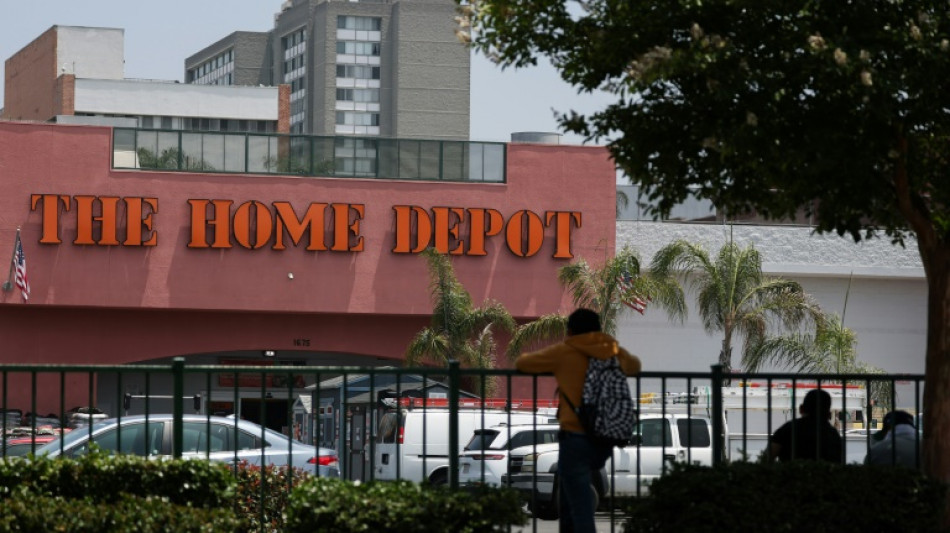
'Terrifying': Migrants fret over LA raids, but still look for work

When immigration officers leapt out of unmarked vans and ran towards undocumented men waiting by a Home Depot in Los Angeles, the day laborers scattered, terrified at the prospect of arrest and deportation.
"People were hiding under wood, in the trash, wherever they could find a little hole," said Oscar Mendia, a Guatemalan who estimated 25 people were arrested.
"It was like something out of a movie."
The raid was part of an anti-immigration crackdown ordered by President Donald Trump that has seen factories and work sites targeted since Friday, sparking days of angry protests in America's second biggest city.
"It all started here," Mendia said, pointing to the parking lot where around 20 workers had gathered on Wednesday.
Mendia, who has lived undocumented in the United States for 26 years, had never been involved in a raid before, not even during Trump's first term.
"It's one thing to see it on television," he said, "But it's another to experience it firsthand."
- 'Families to support' -
Stories of migrants being held in crowded cells, unable to speak to family or lawyers before being rapidly deported are frightening, said another man, aged 40, who did not provide a name.
But they are not enough to keep these workers away from the parking lot, where they gather in the hope of snagging off-the-books work in construction, farming or manual labor.
"It's difficult, but we have to work, we have families to support," said the man, who sends most of his money to Honduras to provide for his six children.
Mendia, who also used remittances to educate and raise his three children in Guatemala, says men like him have less to fear in this anti-immigration climate.
But for the new generation, the situation "is terrifying," he said.
"They come with hope, they come dreaming of a future."
Beside him, a 21-year-old nods nervously.
The young man was saved from Friday's raid because he had already been picked up for a construction project by the time the armed federal agents arrived.
On Monday, he almost didn't come back, but ultimately realized he had no choice.
"We need to do it," he told AFP.
- Paying taxes -
The men's stories are echoed in parking lots, car washes and on construction sites all over Los Angeles and throughout the United States.
They fled countries devastated by economic and political crises, or by violence, in search of work to support their families.
After difficult and dangerous journeys, they work for low salaries, doing the kind of back-breaking jobs many Americans have long since abandoned -- and often pay taxes.
Undocumented migrants contributed nearly $90 billion to the public purse in 2023, according to an analysis by the American Immigration Council.
- 'Country of immigrants' -
Trump returned to power this year after campaigning on a pledge to conduct the biggest deportation operation in US history.
The ramped-up raids this week appear to be part of a push to make do on that promise, and come after White House Deputy Chief of Staff Stephen Miller reportedly ordered ICE (Immigration Customs and Enforcement) bosses to make at least 3,000 arrests every day.
In Los Angeles, a city with large foreign-born and Latino populations, the idea of these masked men swooping has horrified people, many of whom personally know undocumented people.
"Why is Donald Trump doing this?" asked a Mexican man who arrived in the United States nearly three decades ago.
The man, who asked not to be identified, said it was unfair to go after hard-working people who are just trying to make a living.
"Why is he attacking Los Angeles? Because we are a power, because we are the ones who make the economy," he said,
"This country will fall without Latinos."
The migrants of the 21st century might be largely Latinos, but America's rich history is one of waves of different people coming to these shores.
"This is a country of immigrants," said Mendia, recalling Trump's own German roots.
"Everyone from the president to the person who sweeps the streets."
T.Murray--SMC


 London
London

 Manchester
Manchester
 Glasgow
Glasgow
 Dublin
Dublin
 Belfast
Belfast
 Washington
Washington
 Denver
Denver
 Atlanta
Atlanta
 Dallas
Dallas
 Houston Texas
Houston Texas
 New Orleans
New Orleans
 El Paso
El Paso
 Phoenix
Phoenix
 Los Angeles
Los Angeles



